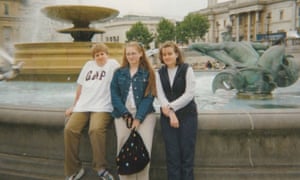Selective mutism wasn’t a diagnosis in common usage among teachers back in the 1980s when I started school; at least, no one ever used the phrase around me. I didn’t hear it until I was an adult, when suddenly it gave a name to “the thing that stopped me speaking for around 25 years of my life”.
It certainly doesn’t feel selective if you’re stuck in it. As described on the website ispeak, selective mutism (SM) is “a severe situational anxiety disorder … [which] generally starts in early childhood but can, if not treated early enough, continue into adulthood. Children and adults with SM are often fully capable of speaking … but cannot speak in certain situations because they are phobic of initiating speech.”
I was just a quiet kid at first – very shy, very jumpy – and I can’t remember exactly why that turned into just not talking any more. There often isn’t a specific reason SM children stop talking; it just happens. I stopped on one of my first days at school, when I mimed colouring a finished picture with a crayon for about an hour, because I couldn’t make myself speak to the teacher. The pretense continued until she realised that no child takes that long to perfect a daffodil.
Physically, I was able to talk. I was fine speaking to my family at home, as soon as the front door closed, but life away from those safe spaces became almost silent, and silent kids who stare wide-eyed at the floor just creep people out after a while. Especially teachers. “She’s very shy” turned into “She won’t answer me”. “She’ll certainly never go to university” in year 2 became “She frequently has a pained expression and does not communicate” in year 5.

The problem was, as one of those kids that cared deeply about what adults thought of them, and genuinely valued good behaviour, not speaking was an Ironman challenge of self-destruction. Whenever a new adult with a wavering smile waited expectantly for me to answer them, I’d be torturing myself: “I need to answer her now – I have to, because she’s so uncomfortable, she’s worried. Stay still and she’ll leave.”
It’s difficult to explain the feeling of selective mutism to someone who’s never been trapped in it. It’s a lot like being frightened all the time and waiting for the next bad thing to happen that you won’t be able to stop. It’s not being able to force a decent voice out, even when you desperately try – a tiny whisper will emerge instead, and it hurts. For the kids at school it meant they could press their forearm against my throat in a hallway between classes if they were having a bad day, and it would be OK; they knew I’d just freeze and wait it out. Yelling, punching, stealing, touching – I’d hear my name being whispered as I went to classes, contorting me into a seven-hour school day cringe, adrenaline always raging.
Teacher after teacher would take me aside to gently ask if there were problems at home, did I get on with my parents, had anything changed recently? I’d fume, inside: “You just watched the class dipshit bounce my head off a wall because he doesn’t understand what you’re teaching him, and you’re asking me if the problem is at home?” What would struggle out was a hoarse “No” and I’d mentally file the teacher away as an idiot. Every year, every subject: “Phoebe works hard but never asks for help”, “Must try to discuss ideas more freely”, “If she were not so shy … ”
On a year 10 parent night schedule, I angrily scrawled this note for my mum: “I hate oral work, tell him to be more gentle on me when we do it! Tell him what we did with The Merchant of Venice was stupid and pointless! I get really upset and worried about performing in front of the class! Please tell him!” But teachers are there to prepare you for the world, not protect you by letting you skip reciting Shylock when it’s your turn. The message they’d instilled in me about what would happen outside, after school, had sunk in deep: I was not OK. Until I received a different message, at 17, from my English literature teacher, Mr Pearman.
He had a blank face that showed no concern about whether his classes were taking in the lesson or not. He’d calmly insult kids he didn’t like with words he knew they wouldn’t understand, and enjoy the confused look he’d get back. He told us, while turning on the overhead projector and leaving it empty, about a fun game he liked to play of turning the projector on with nothing on it to see how long the class would stare stupidly at the wall.
“I hear your other teachers saying you don’t talk,” he told me one day, after I’d been in his class a few weeks. “It’s not a problem. I’ve read your work – it’s good. So, it doesn’t matter to me what you say or don’t. You don’t worry me.” He shrugged, and calmly gazed at me; quiet.
Thank you. “Thank you, thank you,” I whispered quickly, mind whirring: “How can I sum everything up to him – he knows already though, doesn’t he? But I want to tell him. I can’t, but I want to do that for him.”
I couldn’t yet. But that was the start.
A moment that changed me: a teacher’s acceptance of my silence | Phoebe-Jane Boyd
Hiç yorum yok:
Yorum Gönder